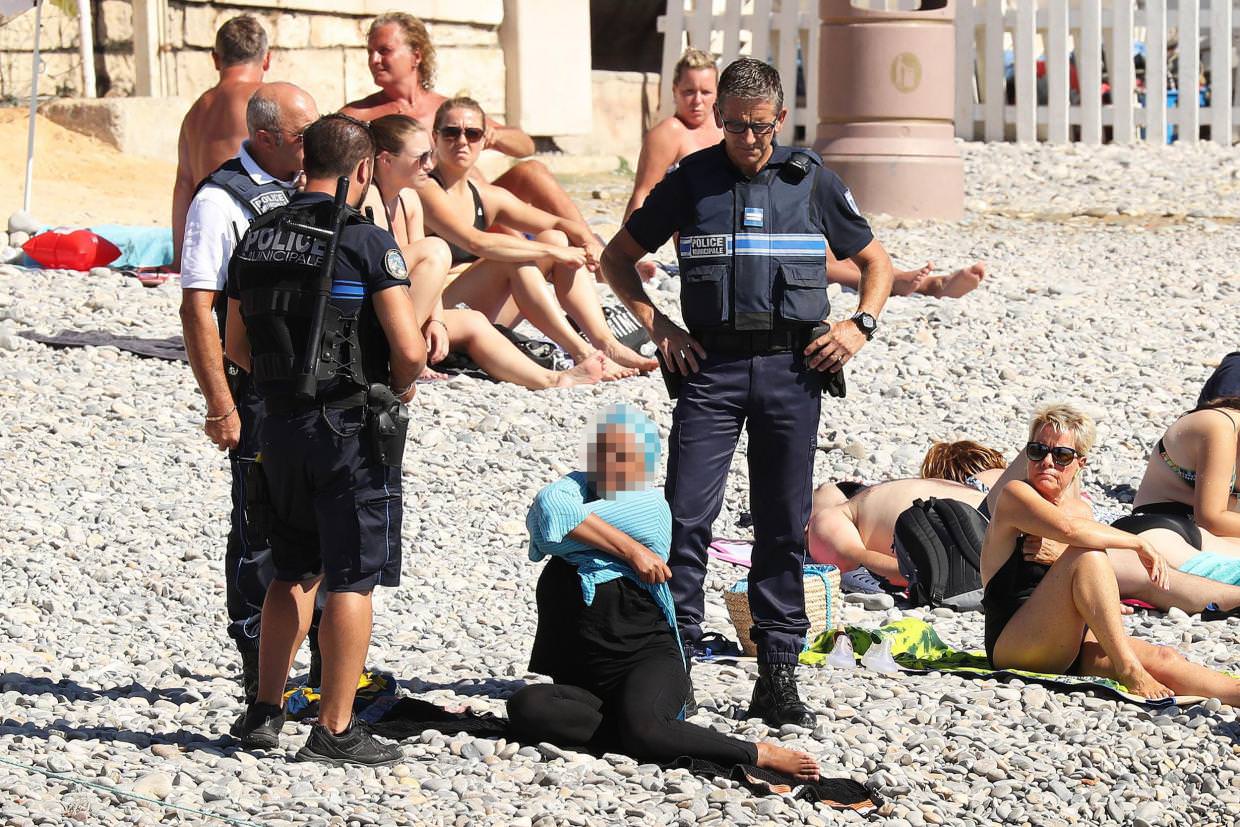Photographs of a Muslim woman removing some parts of her clothing as four policemen tower over her in Nice, France have emerged over the social media on Tuesday and have caused much frenzy. The mother of two was resting on a shore at the town’s Promenade des Anglais, which happens to be the location of a terrorist attack that took place last month, on Bastille Day. In the photographs, the woman can be seen taking off a long sleeved, blue tunic as policemen take notes or appear to issue a fine. According to the Muslim woman, she has been fined while she was with her family, resting on the beach, for wearing inappropriate clothing. She was wearing leggings, a head scarf and a tunic when the incident took place.
An eyewitness, Mathilde Cousin, present at the place of incident told the media, “The saddest thing was that people were shouting ‘go home’, some were applauding the police. Her daughter was crying.” Debates over Muslim women dresses have been a part of the French parliament for quite some time now. Back in 2004, France imposed a complete ban on niqab and burqa for Muslim women which met with a lot of criticism and uproar. Burkini bans were imposed in 15 coastal towns of France by their respective mayors, with Nice being one of the latest towns in the row.
The history of Burkini bans dates back to the burkini ban that was imposed by the Corsican mayor, Ange-Pierre Vivoni, after skirmishes took place between Muslim families and locals on the beach of Corsica, as reported by The Guardian on August 15th, 2016. Earlier, mayor of Cannes, David Lisnard , banned burkini following the Bastille Day attack in Nice on July 2016. According to the decree signed by the mayor of Cannes, women will be forbidden from wearing a burkini as they can pose a public threat and women who do so will face a fine of €38 (£33). The decree that he signed elaborated, “Beachwear which ostentatiously displays religious affiliation, when France and places of worship are currently the target of terrorist attacks, is liable to create risks of disrupting public order (crowds, scuffles etc), which it is necessary to prevent.”
Burkini ban has faced a lot of backlash, not only from the Muslim community but also by non-Muslims. Aheda Zanetti, Australian designer of Burkini spoke to The Guardian and said, “I can tell you that online on Sunday, we received 60 orders – all of them non-Muslim.” The Australian designer added, “The support I’m getting is somehow about empowering women … I feel like I’ve been a counsellor. It’s a cry of need that they want to have this enjoyment. Women are standing together on this. It doesn’t matter what race or religion.”
Zoe Strimpel writes for The Telegraph,
“France’s anxiety-displacement activity of garb policing is ridiculous in other ways too. First, what a woman chooses to wear – be it a nun’s habit, a sequenned Spanx onesie, a clown’s costume or a burka – should by now not be a matter for social censure let alone state intervention bent on enforcing “good morals”. Women should be able to dress as immorally as they want. After all, for hundreds of years in the West, we were burnt at the stake for looking suspicious; witchlike, immodest, whatever. Even after witch-burnings ended, codes of sexual morality meant fatally constricting whalebone corsets and heavy fabric up to the neck. Sadly, in swathes of the Islamic world, women are still murdered for wrongful dress. At the very least, the modern West needs to allow women to wear what they want without stricture, even if that is an Islamic swimming costume.”

Would France make these ladies to take their clothes off too? #BurkiniBan
As the whole world goes into a frenzy and debate over the France burkini ban, I, as a Muslim feminist have some reservations over it too. According to my personal understanding, burkini ban is an act of curbing the rights of Muslim women to dress the way they want to. I can’t help but draw an analogy here between regressive Muslim societies – where women are forced to cover themselves – and so-called secularist societies – where women are forced to not cover themselves. These, to me, are two different sides of the same coin. Coming from a society where women are dictated to dress and behave in a certain manner, I find this ban equally regressive and suppressive. The ban takes away the right of a woman to wear what she wants and the choice to choose whatever she deems right for herself.
It is an established fact that amongst the Muslim population which makes a total of 7% in France, there are certain elements which facilitate and endorse these attacks. Therefore, even though I totally understand the paranoia of French populations and government due to a series of terrorist attacks over the last few months, burkini ban is not a viable solution to the problem. For months, through magazines and online propaganda, ISIS has been propagating an “us VS them” narrative. Burkini ban is just another act to empower this very narrative of ISIS. If Muslims will not be given the freedom to live their lives according to their free wills, it will only strengthen the foundations and narratives of ISIS.
As a feminist, I feel that this ban is against the very basis of the right to free choice. Burkini ban is a poor attempt at enforcing French secularism or Laïcité. In the French model of secularism, religion has been forced to be kept away from the public sphere thus promoting bigotry against religions. In contrast to French model of secularism, American secularism where state does not patronize a single religion and an Indian secularism where all religions come open in public sphere without state favoring a single religion are far better options to build a pluralistic society.

Even 100 years later women are still being policed on what they wear to the beach #BurkiniBan
Some of the arguments presented in the favor of burkini ban have been irrational and completely ridiculous. For instance, one such argument which states that the ban empowers and liberates Muslim women from the shackles of religion, is senseless. It is similar to enforcing women to cover themselves up. What I find most disturbing in this whole set of events is the hypocrisy involved. While on one side we celebrate women who have given up niqabs that were forced on them, in Iran or the ones who stood up against the Saudi government to demand their rights to drive freely, we on the other hand are shunning women who choose to cover themselves up by free will and forcing them into undressing out in public. This act was not only humiliating but also oppressing and regressive.
Burkini ban will do anything but liberate Muslim women. This ban will only seclude the already secluded Muslim women who will be confined to the walls of their homes. Sarah Haider, an ex-Muslim and relentless critic of Islam, also denounced this ban. She writes, “It may, in fact, do considerable harm to the most powerless of Muslim women – those in conservative households. With a burkini ban, a freedom once available to them will now be taken away. Those women will not begin donning bikinis – garments abhorred by their community and forbidden by their religion – they will, instead, stay home more often, and be more isolated than ever before. In this seclusion, their vulnerability to the pressures of their community and the lures of extremism can only increase.”
Another argument favoring the burkini ban says that you have to follow the laws of the country where you reside. This argument is as baseless as the former. This argument is in a way justifying the harsh laws in many Muslim countries, which are against the will and rights of people, be it the anti-women laws in Saudi Arabia, blasphemy laws in Pakistan or other severe punishments in Iran or Afghanistan.
Molding women into a certain manner and dictating them to behave in a certain way is what can be expected of Muslim societies and is the point which brings a lot of criticism and shame to Muslim countries, internationally. However, when western countries which have for years upheld the norms of liberty and cultural diversity would do the same, would there be any difference between them and the otherwise labeled regressive Muslim states?
About the author(s)
A Pakistani journalist and Culture & Gender scholar at the University of Sydney, Amna Nasir considers herself a hard-core feminist. She is a travel enthusiast and expresses herself through painting, sketching, photography and writing. As clichéd as it may sound, Amna believes in equality of all beings irrespective of their background, colour, gender, religion or ethnicity.





Not any muslim ever fight for the right of naturists to be on the beach with them.